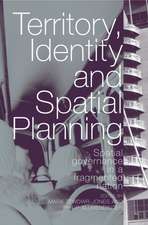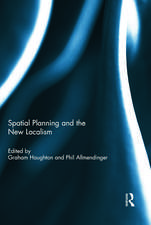Neoliberal Spatial Governance: Routledge Research in Planning and Urban Design
Autor Phil Allmendingeren Limba Engleză Hardback – 14 apr 2016
Whilst there is a lip service towards traditional values, the progressive aims and inclusivity that provided planning’s legitimacy and broad support have now largely disappeared. The result is a growing backlash of distrust and discontent as planning has evolved into neoliberal spatial governance. The tragedy of this change is that at a time when planning has a critical role in tackling major issues such as housing affordability and climate change, it finds itself poorly resourced with low professional morale, lacking legitimacy and support from local communities, accused of bureaucracy and ‘red tape’ from businesses and ministers and subject to regular, disruptive reforms. Yet all is not lost. There is still demand and support for more comprehensive and progressive planning, one that is not purely driven by the needs of developers and investors. Resistance against the idea that planning exists to help roll out development, is growing.
Neoliberal Spatial Governance explores the background and implications of the changes in planning under the governments of the past four decades and the ways we might think about halting and reversing this shift.
| Toate formatele și edițiile | Preț | Express |
|---|---|---|
| Paperback (1) | 325.34 lei 43-57 zile | |
| Taylor & Francis – 12 feb 2018 | 325.34 lei 43-57 zile | |
| Hardback (1) | 850.91 lei 43-57 zile | |
| Taylor & Francis – 14 apr 2016 | 850.91 lei 43-57 zile |
Din seria Routledge Research in Planning and Urban Design
-
 Preț: 327.98 lei
Preț: 327.98 lei -
 Preț: 154.16 lei
Preț: 154.16 lei -
 Preț: 348.19 lei
Preț: 348.19 lei -
 Preț: 317.06 lei
Preț: 317.06 lei -
 Preț: 311.41 lei
Preț: 311.41 lei -
 Preț: 311.41 lei
Preț: 311.41 lei -
 Preț: 294.81 lei
Preț: 294.81 lei -
 Preț: 292.39 lei
Preț: 292.39 lei -
 Preț: 334.06 lei
Preț: 334.06 lei -
 Preț: 340.98 lei
Preț: 340.98 lei - 31%
 Preț: 763.39 lei
Preț: 763.39 lei - 26%
 Preț: 875.97 lei
Preț: 875.97 lei - 26%
 Preț: 846.50 lei
Preț: 846.50 lei - 18%
 Preț: 1216.52 lei
Preț: 1216.52 lei - 18%
 Preț: 1005.01 lei
Preț: 1005.01 lei - 26%
 Preț: 764.20 lei
Preț: 764.20 lei - 14%
 Preț: 338.33 lei
Preț: 338.33 lei -
 Preț: 284.52 lei
Preț: 284.52 lei -
 Preț: 469.34 lei
Preț: 469.34 lei -
 Preț: 489.26 lei
Preț: 489.26 lei -
 Preț: 449.41 lei
Preț: 449.41 lei - 28%
 Preț: 823.59 lei
Preț: 823.59 lei -
 Preț: 449.41 lei
Preț: 449.41 lei - 24%
 Preț: 324.16 lei
Preț: 324.16 lei - 18%
 Preț: 1106.02 lei
Preț: 1106.02 lei - 26%
 Preț: 766.10 lei
Preț: 766.10 lei - 18%
 Preț: 1161.28 lei
Preț: 1161.28 lei - 18%
 Preț: 1000.27 lei
Preț: 1000.27 lei - 26%
 Preț: 819.91 lei
Preț: 819.91 lei - 18%
 Preț: 1000.13 lei
Preț: 1000.13 lei -
 Preț: 436.14 lei
Preț: 436.14 lei - 18%
 Preț: 999.46 lei
Preț: 999.46 lei - 25%
 Preț: 554.64 lei
Preț: 554.64 lei - 26%
 Preț: 764.20 lei
Preț: 764.20 lei - 28%
 Preț: 822.76 lei
Preț: 822.76 lei - 18%
 Preț: 1163.19 lei
Preț: 1163.19 lei - 18%
 Preț: 1000.76 lei
Preț: 1000.76 lei - 28%
 Preț: 847.34 lei
Preț: 847.34 lei - 25%
 Preț: 569.79 lei
Preț: 569.79 lei - 25%
 Preț: 767.88 lei
Preț: 767.88 lei - 25%
 Preț: 852.63 lei
Preț: 852.63 lei - 18%
 Preț: 1169.16 lei
Preț: 1169.16 lei - 18%
 Preț: 1110.74 lei
Preț: 1110.74 lei
Preț: 850.91 lei
Preț vechi: 1142.32 lei
-26% Nou
Puncte Express: 1276
Preț estimativ în valută:
162.82€ • 170.45$ • 134.72£
162.82€ • 170.45$ • 134.72£
Carte tipărită la comandă
Livrare economică 07-21 aprilie
Preluare comenzi: 021 569.72.76
Specificații
ISBN-13: 9781138936751
ISBN-10: 1138936758
Pagini: 252
Ilustrații: 7 black & white tables, 2 black & white line drawings
Dimensiuni: 156 x 234 x 19 mm
Greutate: 0.63 kg
Ediția:1
Editura: Taylor & Francis
Colecția Routledge
Seria Routledge Research in Planning and Urban Design
Locul publicării:Oxford, United Kingdom
ISBN-10: 1138936758
Pagini: 252
Ilustrații: 7 black & white tables, 2 black & white line drawings
Dimensiuni: 156 x 234 x 19 mm
Greutate: 0.63 kg
Ediția:1
Editura: Taylor & Francis
Colecția Routledge
Seria Routledge Research in Planning and Urban Design
Locul publicării:Oxford, United Kingdom
Public țintă
Postgraduate and UndergraduateCuprins
1. Change and Planning, 2.The Rise and Fall of the Consensus on Planning, 3. New Understandings – a Reinvigorated and Fragmented Left, 4. New Understandings – A Reinvigorated and Unified Right, 5. From New Right to Neoliberal Spatial Governance, 6. A New Ethos, 7. A New Politics for Planning, 8. New Spaces and Scales, 9. Localism, the Big Society and Austerity Planning, 10. Conclusions
Notă biografică
Phil Allmendinger is Professor of Land Economy at the University of Cambridge, a Fellow of Clare College and Head of the School of Humanities and the Social Sciences.
Descriere
Neoliberal Spatial Governance explores the background and implications of the changes in planning under the governments of the past four decades and the ways we might think about halting and reversing this shift.


















